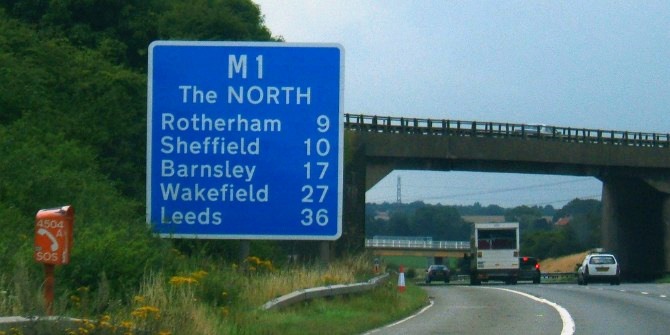Evolution or revolution: Spending Review implications for local government and the Northern Powerhouse
Despite being trumpeted as a “devolution revolution”, the detail of the Spending Review suggests that the government’s approach is distinctly evolutionary; the Treasury is far happier passing down the axe than cutting local government loose. But that doesn’t mean there isn’t a positive story to tell about local growth and the Northern Powerhouse, writes Ed Cox.

Credit: rusty_dragonfly CC BY-NC 2.0
As far as the Spending Review report is concerned, English devolution starts with local government reform and further ‘efficiencies’. Wholesale review of the local government finance system is long overdue and the ambition for 100 per cent business rate retention by the end of the Parliament is ambitious, particularly in light of the aspiration to phase out the main local government revenue support grant. The devil will be in the detail.
The local government revenue support grant has been instrumental in supporting more economically disadvantaged areas and so to phase it out in favour of business rates retention will give those areas great cause for concern. Some form of redistribution will still be necessary and so the timetable over which this might happen, population and growth estimates and the frequency of system ‘resets’ will all be critical details in determining the new system’s winners and losers. Many will fear these changes will simply continue the steady attrition of local government funding and services, including a £600m cut to the Educational Services Grant squirrelled away in the fine detail.
In this context, protecting social care spending through giving councils the ability to raise a special precept to raise council tax by two per cent is some form of release valve. But IPPR analysis shows that it won’t be enough. And councils will think twice before putting it to a public referendum. If ever there was a clear case for government devolving the blame for cuts then this will be it.
In the case of this council tax precept and the proposed business rate precept to fund further infrastructure investment, government is proposing they are ring-fenced for specific purposes. This again undermines any genuine commitment to proper fiscal devolution. Without such ring-fencing (or indeed the need for referendums), the fiscal freedoms offered to councils would be greatly enhanced. The thought of imposing such restrictions on Scotland or Wales would be anathema; indeed the Spending Review has pushed fiscal freedom in Wales one step further: one wonders why if income tax devolution is good enough for Scotland and Wales then why not for the much bigger Northern Powerhouse?
Another release valve suggested by the Chancellor is to give local authorities more freedom to benefit from the sale of assets. This will be an opportunity for some councils, but selling the family silver to fund rising revenue demands is not normally considered a prudent course of action.
If local government finance is going to be more dependent upon business rates, then at least the Chancellor has got a better story to tell on local growth. It is true that jobs growth in the North has been impressive in recent times but seen in isolation there are risks a single metric can be overplayed. IPPR North has set out 11 indicators that will together determine the success of the Northern Powerhouse.
The Chancellor’s further announcements about investment in Northern connectivity are welcome as are the multiple investments in business support, innovation, culture and the arts. Money for smart ticketing, regional air connectivity and a Northern Powerhouse Investment Fund for small business add up to nearly £1bn, along with further enterprise zones and investments in advanced materials, anti-microbial resistance research and agricultural technology, but these are small beer in comparison to transport infrastructure investment.
The Chancellor continues to namecheck the Trans-Pennine and other Transport for the North improvements which are long overdue, but there is still no additional capital commitment beyond the previously announced £13bn which will fall well short of the forthcoming Transport for the North plans due in time for the budget next March. It is also important to note that the £61bn new money committed to transport capital overall will only return transport investment to its levels in 2009/10.
Together with the devolution deals and the relative protection of university funding, the Northern Powerhouse package is certainly of some substance. Whether or not it drives up business rate revenues at the pace and scale necessary for Northern local authorities to come through the next 5 years remains to be seen. Revolution or evolution, it will be a rocky road ahead for those responsible for making all this work.
—
Note: This article gives the views of the author, and not the position of Democratic Audit, nor of the London School of Economics. It originally appeared on the LSE Politics and Policy blog. Please read our comments policy before posting.
—
 Ed Cox is Director of IPPR North. He tweets from @edcox_ippr
Ed Cox is Director of IPPR North. He tweets from @edcox_ippr





 Democratic Audit's core funding is provided by the Joseph Rowntree Charitable Trust. Additional funding is provided by the London School of Economics.
Democratic Audit's core funding is provided by the Joseph Rowntree Charitable Trust. Additional funding is provided by the London School of Economics.
What Spending Review means for local gov’t & Northern Powerhouse. IPPR’s @edcox_ippr writes for @democraticaudit https://t.co/Ohp8NKpdRq
Evolution or revolution: Ed Cox on #SpendingReview implications for local government & the #NorthernPowerhouse https://t.co/nGEMb7LPpw
Evolution or revolution: #SpendingReview implications for local government & the #NorthernPowerhouse https://t.co/OTeIEBELK4
Evolution or revolution – The Spending Review, councils & the Northern Powerhouse https://t.co/PUJl1I9k6x
Evolution or revolution: Spending Review implications for local government and the Northern Powerhouse https://t.co/HYjlgrVzWp
Evolution or revolution: Spending Review implications for local government and the Northern Powerhouse https://t.co/EN4icarm4W
Evolution or revolution: Spending Review implications for local government and the… https://t.co/gsXAeqJQ3q https://t.co/80A2AhajUe